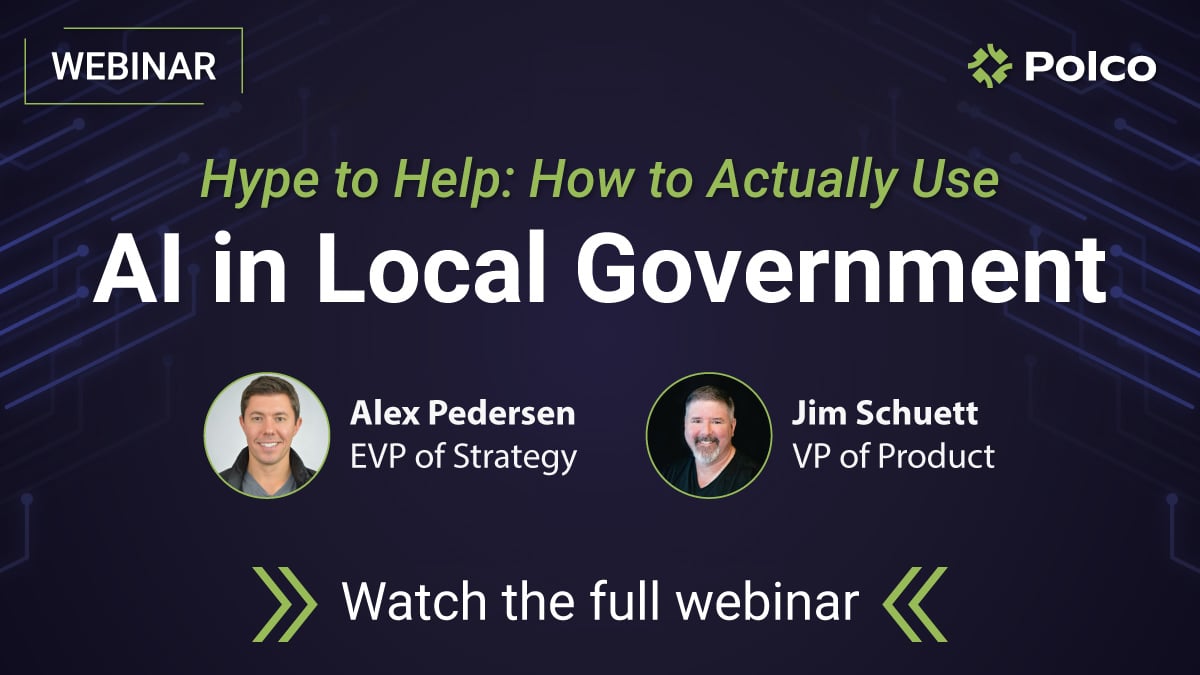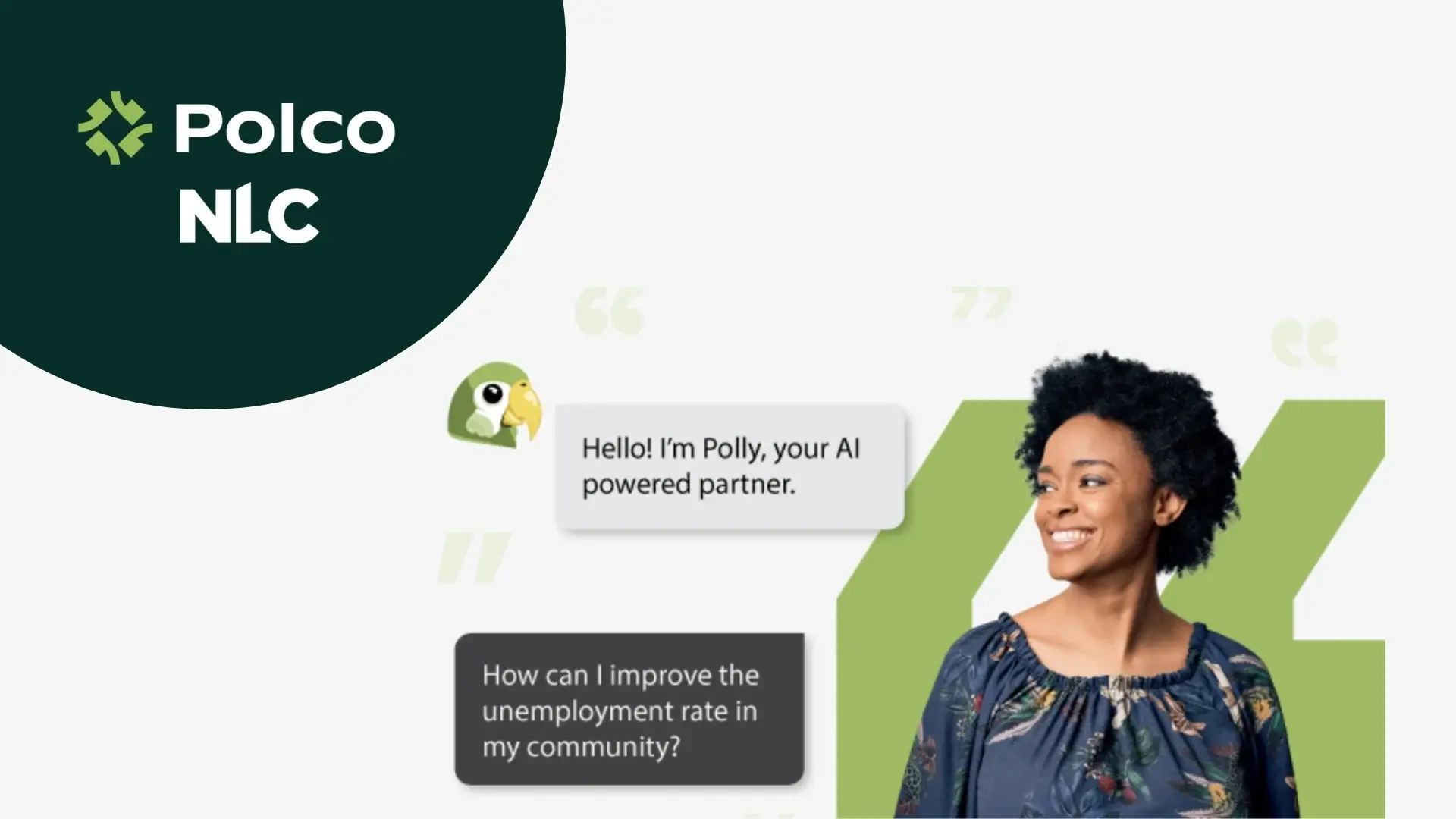Hype to Help: How to Actually Use AI in Local Government
By Polco on October 17, 2025

Artificial intelligence (AI) has rapidly gone from a fringe topic to front-page news - and now it's knocking on the doors of city halls, libraries, and council chambers. But what’s hype, and what’s actually helpful?
In Polco’s recent webinar, “Hype to Help: How to Actually Use AI in Local Government,” Alex Pedersen and Jim Schuett broke down AI’s role in public service using a 10-part roadmap. This session offered local leaders a realistic, practical lens on where AI fits (and where it doesn’t) in the day-to-day operations of government.
Webinar recap
10 Essentials for Understanding AI in Local Government
The presentation walked through 10 key topics, each designed to demystify the AI landscape and bring local relevance to a complex subject:
- Quick History of Modern AI
From 1950s vacuum tubes to ChatGPT-4o, the journey of AI is decades long, and full of twists. The history helped set the stage for understanding today’s breakthroughs. - The Hype Cycle
Borrowing from Gartner’s framework, Alex explained how AI has surged through the "peak of inflated expectations" and is now in a more grounded phase: “the slope of enlightenment.” - Hype vs. Reality
Despite flashy headlines, AI won't replace entire departments. But used wisely, it can significantly boost productivity and augment human decision-making. - What’s Happening Now
From AI image generation to voice assistants and small custom models, the presenters showcased current trends, including the rise of agentic AI and media generation tools. - Understanding Today’s AI Abilities
Think autocomplete, but turbocharged. Modern AI excels at pattern recognition, content generation, and summarization, but it lacks reasoning, empathy, and contextual understanding. - Risk Management
With great power comes great risk. Data privacy, ethical use, misinformation, and over-reliance were highlighted as critical concerns governments must address before scaling AI adoption. - AI Models & System Basics
A crash course in the difference between foundational models (like GPT-4) and application layers (like chatbots or writing assistants). Think: the engine vs. the car. - Common Terms, Prompting, and Data
Alex and Jim covered must-know terms like LLMs, tokens, and embeddings, and gave simple tips on writing better prompts, like “talk to the AI like it’s a helpful intern.” - Local Government Needs and Fit
Not every city needs a chatbot. But almost every local government has repeatable tasks, overflowing inboxes, or public-facing content that could benefit from AI. - How to Proceed
Start small. Pick one use case. Build trust with your team. And set policies early to avoid misuse later.
“AI doesn’t replace leadership,” said Alex. “It can help you lead more effectively, if you use it the right way.”
Pulse Check: How Attendees Feel About AI Now
Early on, attendees were polled about their current feelings on AI. Over 50% said they felt excited, a notable shift from previous webinars where fear and confusion led the conversation.
This enthusiasm reflects a broader trend: AI curiosity is rising, and local governments are eager to understand the tools before they’re swept up in a tech wave.
Practical Use Cases for Local Government
Rather than focusing on big, theoretical possibilities, the webinar emphasized practical ways AI can support day-to-day work for cities and counties:
- Uniting Fragmented Data
Use AI to help summarize or align disconnected systems like surveys, budget spreadsheets, and performance dashboards. - Budget Communication
Translate complex budget documents into plain language with tools like Polco’s AI assistant, Polly, useful for press releases, council briefings, or community FAQs. - Grant Writing and Reports
Speed up first drafts while keeping humans in the loop for review and customization. - Content Creation and Recap
Automatically summarize meeting minutes, write follow-up emails, or generate blog posts, just like this one. - Public-Facing FAQ Support
Build custom AI agents that answer community questions based on verified inputs (e.g. your budget, strategic plan, or zoning policy).
Avoid the Pitfalls
AI isn’t plug-and-play magic. The speakers stressed the importance of ethical frameworks, transparent practices, and human oversight.
Key risks include:
- Never trust output blindly - always check for hallucinations or outdated info.
- Use trusted inputs - like official documents, surveys, and expert-reviewed data.
- Stay transparent - if you’re using AI to generate public content, let your community know.
The solution? Treat AI like a junior staffer: helpful, but not yet trustworthy on its own.
Ready to Get Started?
Here’s a 3-step plan for responsible adoption:
- Assess Where You’re Struggling
Are your teams buried in data? Spending too much time rewriting similar content? Juggling a messy tech stack? Start there. - Use AI to Amplify, Not Replace
Tools like Polly (content generation and data insights) and Grace (grant and data exploration) can give your team a running start without compromising quality or integrity. - Build Guidelines for Responsible Use
Set internal norms around data sources, review protocols, and acceptable use cases. Treat AI like a new team member, it needs onboarding, oversight, and a clear job description.
Final Takeaway
The future of AI in local government isn’t about replacing jobs or making splashy headlines. It’s about amplifying human insight, simplifying administrative work, and freeing up time to focus on what really matters: serving your community.
As Jim put it: “Start with something small, useful, and measurable. Success with AI begins when it helps you do your job, not distract from it.”
The AI conversation in government is moving fast, but the smart communities aren’t rushing. They’re starting with small, meaningful experiments, asking the right questions, and staying grounded in their mission.
AI won’t solve everything. But used well, it can help you do what you already do, better, faster, and more effectively.
Want to Learn More?
Polco is committed to helping local governments use AI responsibly and effectively. Learn more about our AI assistants, including Polly and Grace, or check out upcoming webinars.
Popular posts
Sign-up for Updates
You May Also Like
These Related Stories

AI Is Here. Are Local Governments Ready For It?

AI in Action: How Governments Are Turning to Technology to Drive Change


